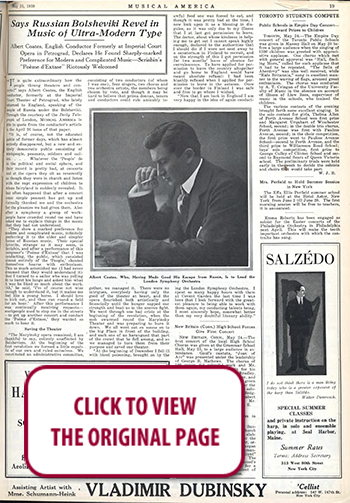 100 YEARS AGO IN MUSICAL AMERICA (282)
100 YEARS AGO IN MUSICAL AMERICA (282)
May 31, 1919
Page 19
Says Russian Bolsheviki Revel in Music of Ultra-Modern Type
Albert Coates, English Conductor Formerly at Imperial Court Opera in Petrograd, Declares He Found Sharply-marked Preference for Modern and Complicated Music—Scriabin’s “Poème d’Extase” Riotously Welcomed
"IT is quite extraordinary how the people throng theaters and concerts!” says Albert Coates, the English conductor, formerly at the Imperial Court Theater of Petrograd, who lately returned to England, speaking of the people of Russia under the Bolsheviki. Through the courtesy of the Daily Telegraph of London, MUSICAL AMERICA is able to quote from the conductor’s article in the April 26 issue of that paper.
“It is, of course, not the educated public of former days, which has almost entirely disappeared, but a new and entirely democratic public consisting of workpeople, peasants, soldiers and sailors. . . . Whatever the ‘People’ do in the political and social sphere, and their record is pretty bad, at concerts and at the opera they sit as reverently as though they were in church and listen with the rapt expression of children to whom fairyland is suddenly revealed. It has often happened that after a concert some simple peasant has got up and formally thanked me and the orchestra for the pleasure we had given them. Also after a symphony a group of workpeople have crowded round me and have asked me to explain things in the music that they had not understood.
“They show a marked preference for modern and complicated music, infinitely preferring it to the older and simpler forms of Russian music. Their special favorite, strange as it may seem, is Scriabin, and after a performance of this composer’s ‘Poème d’Extase’ that I was conducting, the public, which consisted almost entirely of the ‘People,’ shouted themselves hoarse with enthusiasm. This so much astonished me (I had never dreamed that they would understand it) that I turned to a sailor who was yelling fit to burst his lungs and asked him what it was he liked so much about the work. ‘Ah,’ he said, ‘I’m of course not wise enough to understand it, but it makes me feel like a young horse. I should love to kick out, and then run round a field for an hour.’ After this performance I was continually receiving requests—workpeople used to stop me in the streets—to get up another concert and conduct the ‘Poème d’Extase,’ they wanted so much to hear it.
Saving the Theater
“The Maryinsky opera remained, I am thankful to say, entirely unaffected by Bolshevism. At the beginning of the first revolution we formed a little republic of our own and ruled ourselves. We constituted an administrative committee consisting of two conductors (of whom I was one), four singers, two chorus and two orchestra artists, the members being chosen by vote, and though it may be hard to believe that prima donnas, tenors and conductors could rule amicably together, we managed it. There were no intrigues, everybody having only the good of the theater at heart, and the opera flourished both artistically and financially until the hunger sapped our strength and beat us in the uneven fight. We went through one bad crisis at the beginning of the revolution, when the mob swarmed round the Maryinsky Theater and was preparing to burn it down. We all went out en masse on to the big Place in front of the building, and each one of us harangued that part of the crowd thathe fell among, and so we managed to turn them from their purpose and saved our theater.
“At the beginning of December I fell ill with blood poisoning, brought on by the awful food one was forced to eat, and though it was pretty bad at the time, I now look upon it as a blessing in disguise, as it was only due to my illness that I at last got permission to leave. The doctor, about whose kindness in helping me to get out I cannot speak highly enough, declared to the authorities that I should die if I were not sent away to a sanatorium in Finland to recruit, and on the strength of this I got permission for two months’ leave of absence for convalescence. To have applied for permission to leave the country altogether and go home to England would have meant absolute refusal: I had been blankly refused when I applied for permission to leave in the autumn. Once over the border in Finland I was safe and free to go where I wished.
“Now that I am back in England I am very happy in the idea of again conducting the London Symphony Orchestra. I spent so many happy hours with them at Covent Garden the last time I was here that I look forward with the greatest pleasure to being able to work with them again, my conducting talents being, I most sincerely hope, somewhat better than my very doubtful literary ability.”




 RENT A PHOTO
RENT A PHOTO





